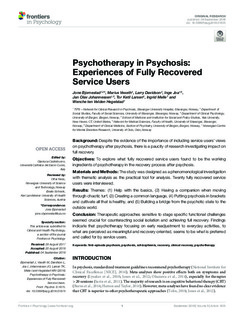| dc.contributor.author | Bjørnestad, Jone Ravndal | |
| dc.contributor.author | Veseth, Marius | |
| dc.contributor.author | Davidson, Larry | |
| dc.contributor.author | Joa, Inge | |
| dc.contributor.author | Johannessen, Jan Olav | |
| dc.contributor.author | Larsen, Tor Ketil | |
| dc.contributor.author | Melle, Ingrid | |
| dc.contributor.author | Hegelstad, Wenche | |
| dc.date.accessioned | 2019-02-21T12:06:11Z | |
| dc.date.available | 2019-02-21T12:06:11Z | |
| dc.date.created | 2018-09-26T14:43:54Z | |
| dc.date.issued | 2018-09 | |
| dc.identifier.citation | Bjørnestad, J., Veseth, M., Davidson, L. et al. (2018) Psychotherapy in psychosis: Experiences of fully recovered service users. Frontiers in Psychology. 9:1675 | nb_NO |
| dc.identifier.issn | 1664-1078 | |
| dc.identifier.uri | http://hdl.handle.net/11250/2586758 | |
| dc.description.abstract | Background: Despite the evidence of the importance of including service users’ views on psychotherapy after psychosis, there is a paucity of research investigating impact on full recovery.
Objectives: To explore what fully recovered service users found to be the working ingredients of psychotherapy in the recovery process after psychosis.
Materials and Methods:The study was designed as a phenomenological investigation with thematic analysis as the practical tool for analysis. Twenty fully recovered service users were interviewed.
Results: Themes: (1) Help with the basics, (2) Having a companion when moving through chaotic turf, (3) Creating a common language, (4) Putting psychosis in brackets and cultivate all that is healthy, and (5) Building a bridge from the psychotic state to the outside world. Conclusion: Therapeutic approaches sensitive to stage specific functional challenges seemed crucial for counteracting social isolation and achieving full recovery. Findings indicate that psychotherapy focusing on early readjustment to everyday activities, to what are perceived as meaningful and recovery-oriented, seems to be what is preferred and called for by service users. | nb_NO |
| dc.language.iso | eng | nb_NO |
| dc.publisher | Frontiers Media | nb_NO |
| dc.rights | Navngivelse 4.0 Internasjonal | * |
| dc.rights.uri | http://creativecommons.org/licenses/by/4.0/deed.no | * |
| dc.subject | psykose | nb_NO |
| dc.subject | schizofreni | nb_NO |
| dc.subject | psykoterapi | nb_NO |
| dc.subject | recovery | nb_NO |
| dc.title | Psychotherapy in psychosis: Experiences of fully recovered service users | nb_NO |
| dc.type | Journal article | nb_NO |
| dc.type | Peer reviewed | nb_NO |
| dc.description.version | publishedVersion | nb_NO |
| dc.rights.holder | © The authors | nb_NO |
| dc.subject.nsi | VDP::Medical disciplines: 700::Clinical medical disciplines: 750::Psychiatry, child psychiatry: 757 | nb_NO |
| dc.source.pagenumber | 1-7 | nb_NO |
| dc.source.volume | 9 | nb_NO |
| dc.source.journal | Frontiers in Psychology | nb_NO |
| dc.identifier.doi | 10.3389/fpsyg.2018.01675 | |
| dc.identifier.cristin | 1614150 | |
| cristin.unitcode | 217,7,3,0 | |
| cristin.unitcode | 217,13,1,0 | |
| cristin.unitname | Institutt for sosialfag | |
| cristin.unitname | Avdeling for folkehelse | |
| cristin.ispublished | true | |
| cristin.fulltext | original | |
| cristin.qualitycode | 2 | |

